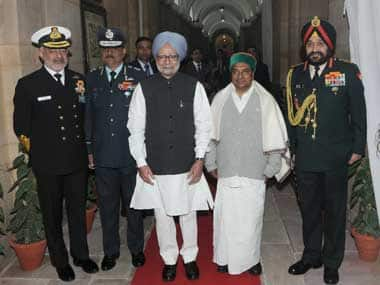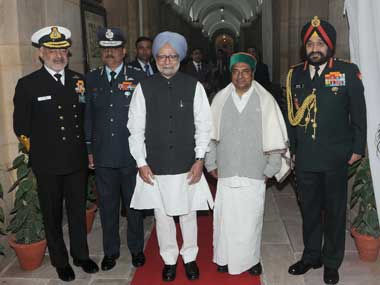New Delhi: Hinting at a possible cut in the country’s defence budget, Prime Minister Manmohan Singh today said the Services will have to exercise prudence in acquisitions in view of the economic slowdown, stressing on the need to “cut our coat according to our cloth”. Addressing the Combined Commanders’ Conference, he said the last two years have seen slow growth and the Services, while taking into account the capabilities of adversaries, will have to “plan our long-term acquisition on the assumption of limited resource availability”.[caption id=“attachment_1244481” align=“alignleft” width=“380”]

Prime Minister Manmohan Singh with Defence Minister AK Antony during the Combined Commanders’-in-Chief Conference, in New Delhi on 22 November 2013. Chief of Army Staff, General Bikram Singh, Chief of Air Staff, Air Chief Marshal NAK. Browne and Chief of Naval Staff, Admiral DK Joshi are also seen. Image courtesy PIB[/caption] “For most of the past decade, we have had the benefit of average annual growth rates of 8 percent. But the last two years have seen slow growth and we continue to face an uncertain international economic climate marked by volatile exchange rate fluctuations and the possibility of fragmenting trade regimes. “I have no doubt that we will overcome our current economic slowdown, but we will have to exercise prudence in our defence acquisition plans and cut our coat according to our cloth,” the prime minister said. Terming the economic slowdown a “looming and serious challenge”, he said, “We need to match our investment in military equipment and forces to our national resources.” The exercise will have to be done “with a high degree of priority and urgency”, the prime minister added. Because of the economic slowdown, the government had last year cut Rs 14,000 crore from the defence budget. This year, the armed forces have been allocated Rs 2.06 lakh crore but there are possibilities of a further cut in that budget. The armed forces have embarked on a major modernisation drive and were looking to spend Rs 6 lakh crore on military purchases in the next five to 10 years. Referring to the global environment, Singh said shifting of economic pendulum inexorably from west to east was being exemplified by the increasing contestation in the seas to our east and the related “pivot” or “rebalancing” by the US in the area. “This, to my mind, is a development fraught with uncertainty. We don’t yet know whether these economic and strategic transitions will be peaceful, but that is the challenge this audience must grapple with institutionally,” the prime minister said. Singh said globalisation has “nurtured intense competition and rivalries in the security domain and managing this contradictory tenor, which has been highlighted by the global surveillance operation mounted by the US National Security Agency, is also a policy imperative for us”. He said “our objective must be to acquire tangible national capacity, or what the lexicon now refers to as comprehensive national power. This is the amalgam of economic, technological and industrial prowess, buttressed by the appropriate military sinews”. On the situation in the neighbourhood, Singh said, “There is no doubt that we will continue to confront formidable challenges.” “Further afield, the continuing turmoil in West Asia could not only imperil our energy security and the livelihood and safety of seven million Indians, but also become a crucible for radicalism, terrorism, arms proliferation and sectarian conflict that could touch our shores too,” he said. Singh said the Asia Pacific region is critical for the country “because it is becoming the arena for shaping the behavior of major powers”. Urging the top defence brass to monitor these specific developments, the Prime Minister said, “Our strategic horizons should also include the need to protect our global seaborne trade in goods, energy and minerals, the well-being of Indian expatriate communities worldwide and the growing global footprint of Indian capital.” “As our capabilities grow, we will increasingly be called upon to help in natural disasters or zones of conflict and instability,” he said. On ways to deal with the challenges, the prime minister urged the defence ministry, armed forces and the DRDO to “urgently review the different task force reports that our government has initiated with a view to achieving a higher index of indigenous capability in military inventory production”. He said for a long time “we have debated the merits of private versus public sector. It would be more useful to think in terms of aggregate national capacity that harnesses the full power of our public sector, private enterprises, research laboratories and universities to create an innovative and efficient indigenous base for production, research and development”. The prime minister said, “We must also take advantage of a favourable international environment to build a domestic defence industrial base.” Stressing that globalisation has had impact on the people including those from the military and said the senior forces’ leadership was responsible for the lives and welfare of your men and women in uniform. “As commanders, you also have to introspect over fidelity to inviolable principles and set an example. Where the institution has frayed, remedial policy initiatives are imperative and I urge you to heed the old adage that the management of human resources is of the highest importance to any military,” he said. In his speech, Singh paid tributes to the 18 sailors who lost their lives in the INS Sindhurakshak mishap, pilots and men who died during the Uttarakhand relief operations and all those who died while serving the country. PTI
Slowdown effect: Be prudent in defence acquisition, PM tells Services
FP Archives
• November 22, 2013, 20:32:33 IST
The armed forces have embarked on a major modernisation drive and were looking to spend Rs 6 lakh crore on military purchases in the next five to 10 years.
Advertisement
)